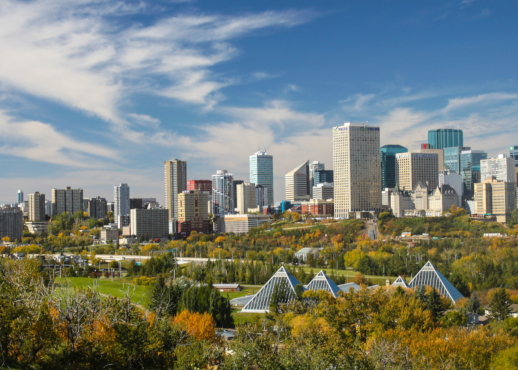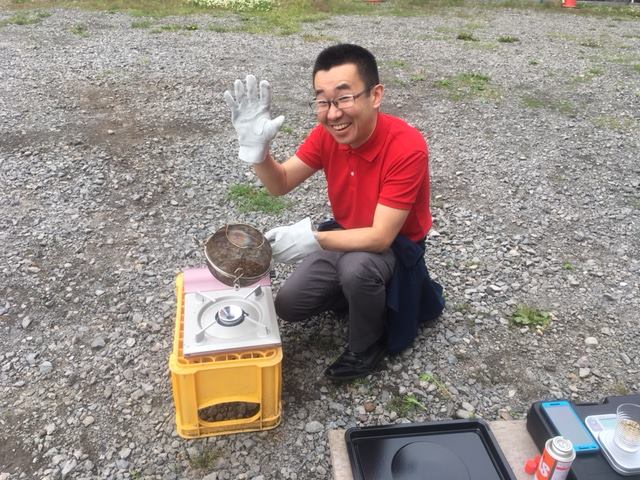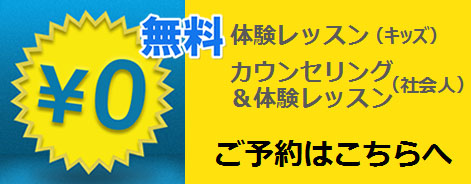Shun Komatsu
Your last name is “Komatsu”. Are you from Japan?
シュン先生の名字は「小松」ですが、日本生まれなのですか?
シュン先生の名字は「小松」ですが、日本生まれなのですか?
 No, actually I was born and raised in Canada. My parents moved from Hokkaido to a city called Edmonton in the province of Alberta before I was born.
No, actually I was born and raised in Canada. My parents moved from Hokkaido to a city called Edmonton in the province of Alberta before I was born.いいえ、実は生まれも育ちもカナダです。私が生まれる前、両親が北海道からアルバータ州のエドモントン市に移住したんです。
Did you speak Japanese at home in Canada?
カナダでは日本語を使って生活していましたか?
カナダでは日本語を使って生活していましたか?
Apart from, “itadakimasu” and “gochisosama”, my parents spoke only English to me at home. Like many new Canadians of my parents’ generation, they decided to teach me English exclusively as it is the language spoken there. I really wish that they had taught me Japanese, as I struggle with learning it now.
家ではずっと「いただきます」と「ごちそうさま」以外、両親は私に英語で話していました。両親の世代のカナダ移住者はどこでもそうだったのですが、現地で使われることばである英語だけを子どもに教えたんです。今私は日本語に苦労しているので、子どもの時に教えてくれていれば、と思いますね。
When did you first come to Japan?
初めて日本に来たのはいつですか?
初めて日本に来たのはいつですか?
I had just finished fourth grade in elementary school and my parents decided to take my sister and I on vacation in Japan. We stayed at my father’s parents’ house and my mother’s parents’. I think I was ten years old.
小学4年生の終わりに、両親が休暇で私と妹を日本に連れて来てくれて、父方の実家と母方の実家に泊まりました。私が10才の時だったと思います。
Did you find that you had culture shock when you came to Japan?
日本でのカルチャーショックはありましたか?
日本でのカルチャーショックはありましたか?
Yes, very much so. I met my cousins for the first time in my life, but I didn’t understand anything they were saying. I didn’t understand anything on TV, or my grandparents. I found it very disorienting. My grandparents were very kind to my sister and I but fed us food we weren’t used to and I remember having to go to the hospital because my stomach couldn’t handle it. Despite that, I had a great time and I loved seeing the summer festivals and the sights around Hokkaido. I visited a couple of more times after that, including a time in my twenties when I spent almost four years in the country teaching English.

はい、すごくありましたね。生まれて初めていとこ達に会ったのですが、みんなが何を言っているのか全然わかりませんでした。テレビも祖父母もぜんぜんわからないし、かなり混乱しました。祖父母はとても優しかったのですが、それまで食べた事もない物が食事に出てきて、私はおなかを壊して病院に行ったのを覚えています。それ以外はすごく楽しくて、夏祭りを見たり、北海道観光をして楽しかったです。その後も2回訪れたのですが、20代に来た時は4年近くいて英語を教えていました。
How did you find METS?
どういういきさつでMETSに入ったのですか?
どういういきさつでMETSに入ったのですか?
I was working a job in government building management in Edmonton when I realized that I really missed teaching English. I also realized that I really missed living in Japan. My new goal was to move to Japan again and start teaching English, so I began searching online for jobs. I found METS, sent in my resume and had a couple of interviews over Skype and was hired!
私はエドモントンで官庁ビル管理会社で働いていたのですが、英語を教えていた頃がすごく懐かしくなって、同時に日本での生活も恋しくなっていました。そこで、また日本に来て英語を教えようと決心し、オンラインで職探しをしました。そしてMETSを見つけて、履歴書を送り、何度かスカイプで面接を重ねて、採用!となりました。
What do students do in class that encourages you?
レッスンでは生徒たちがやってもらって嬉しいことは何ですか?
レッスンでは生徒たちがやってもらって嬉しいことは何ですか?
Kids are natural learners. I find that when kids are allowed to express themselves and solve problems on their own, they flourish. When I see students thinking in English, and not just repeating grammar, that’s when I feel they have succeeded, and it’s at that point that I know that they are using language as a living, breathing communication tool.
子どもは自然に学びとるものです。経験上、子ども達にまかせて表現させたり問題を解いたりさせると、開花します。私が見て生徒が、「文法をただ真似している」のではなく、「頭の中で英語で考えている」と感じる時が、生徒が成しとげた瞬間だと思います。その瞬間、生きて血の通ったコミュニケーションの手段として、生徒が英語を使っているのだと思います。
What do you think sets METS apart from other schools?
METSの利点は何だと思いますか?
METSの利点は何だと思いますか?
At METS, instructors have the flexibility to adjust the content to match the students’ abilities and strengths. The class sizes are also smaller to increase the attention each individual student receives. All instructors regularly exchange ideas and actively find ways to make classes engaging to maximize students’ potentials. METS also selects instructors with years of experience who understand and know how to overcome the challenges teaching students of all ages brings.
METSには生徒達の特性や経験値によって講師が内容を合わせられる柔軟性があります。クラスも少人数制なので、生徒ひとりひとりにより細かく気を配る事ができます。また、講師全員で定期的に意見交換をするので、もっと生徒の理解が深まるようなアイデアやアクティビティーでレッスンを向上できます。あらゆる世代の生徒達を教える事ができて経験が長い、という基準で講師を採用している、とういうのもMETSの特色です。
What language do you use to speak with your children?
Do you make an effort only to use English?
子供と話すときに何語で喋りますか?策戦はありますか?
Do you make an effort only to use English?
子供と話すときに何語で喋りますか?策戦はありますか?
Here in Japan, I have been making an effort to speak only English with my kids at home. In Canada, I had made an effort to speak only Japanese in order to learn myself, as well as make sure my kids had the opportunity to learn it, unlike how I was brought up. Now, it has been a bit of a challenge to get my kids to speak English, though, and I have been increasing my efforts to try to get them to converse more.
日本では、家で自分の子ども達には英語だけで話すようにしています。カナダでは私も覚えたかったし、子ども達に学ぶ機会が欲しかったので日本語だけで話すようにがんばっていたんですけどね。私がそう育てられなかったので。今うちの子ども達に英語を話させるのはちょっと大変ですが、なんとかもっと会話するようにしています。
Do you have a secret talent? How did you get good at it?
特技・得意なことは何ですか?どうやって身につけたのですか?
特技・得意なことは何ですか?どうやって身につけたのですか?
 I developed my own way to roast coffee using regular household items. When I was in my early twenties I travelled to Brazil and spent about three months there exploring the country. I remember that the coffee there tasted nothing like the stuff I drank in Canada – it was much, much better. I decided that I wanted to replicate that experience back at my own home. I experimented with different metal meshes and different heat sources, different coffee beans and different ways of grinding the coffee. I finally arrived at a simple, cheap way to roast and grind my own coffee that tastes similar to what I drank In Brazil. Every once in a while on a Sunday, you’ll find me roasting coffee beans over a small gas burner and making a pot of really rich, thick coffee.
I developed my own way to roast coffee using regular household items. When I was in my early twenties I travelled to Brazil and spent about three months there exploring the country. I remember that the coffee there tasted nothing like the stuff I drank in Canada – it was much, much better. I decided that I wanted to replicate that experience back at my own home. I experimented with different metal meshes and different heat sources, different coffee beans and different ways of grinding the coffee. I finally arrived at a simple, cheap way to roast and grind my own coffee that tastes similar to what I drank In Brazil. Every once in a while on a Sunday, you’ll find me roasting coffee beans over a small gas burner and making a pot of really rich, thick coffee.家にある物を使って、自己流のコーヒーの焙煎を編み出しました。20代前半に3ヶ月ブラジルを旅行していろいろと見てきたのですが、コーヒーの味が全然違って、自分がカナダで飲んでいたものよりももっともっとおいしかったのを覚えています。家に帰ってからあの味を再現したくていろいろと試してみました。色々な金網や熱源、コーヒー豆、挽き方を実験してみて、最終的にシンプルで安価なロースト&挽き方で、ブラジルで飲んだのと同じような味を出せる所までたどり着きました。たまの日曜日、小さなガスバーナーの上でローストした豆で極めてリッチで濃いコーヒーを淹れています。







